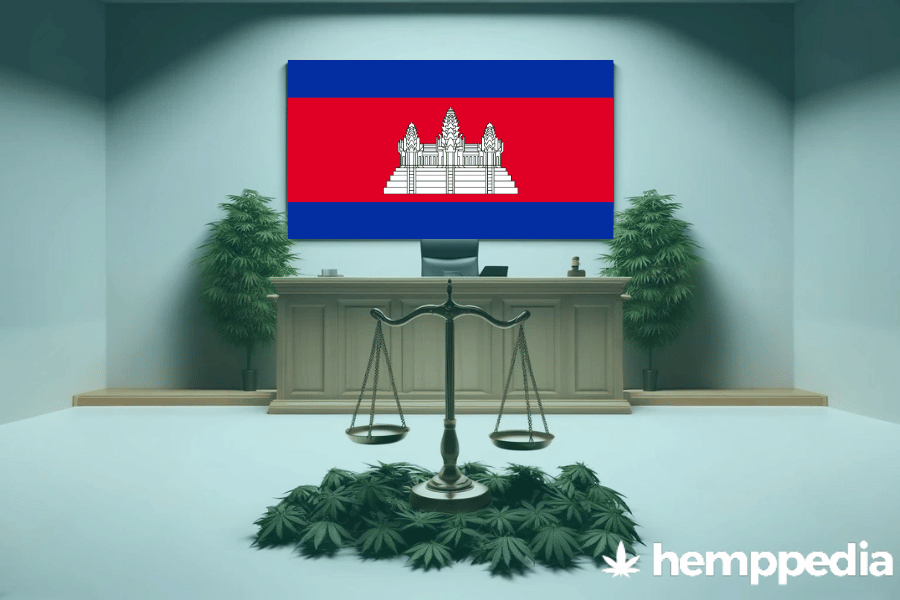TL;DR
In Cambodia, the legal situation regarding cannabis is complex. While cannabis usage and cultivation isn’t explicitly legal, it is reportedly widely tolerated under certain circumstances, with local authorities often turning a blind eye to small-scale cultivation and usage. However, Cambodia has strict anti-drug laws, and larger-scale cultivation, sale, and trafficking of cannabis can lead to serious penalties.
| THC | CBD | |
|---|---|---|
| Recreational | No | Yes |
| Medical | No | Yes |
Introduction
The changing tide in cannabis legislation around the world has brought with it both clarity and confusion. Depending on the country, the plant could be deemed legal, decriminalized, or strictly forbidden, with nations varying wildly in their approach to both medical and recreational use. While some nations have embraced the touted health benefits of CBD and THC (the two primary compounds found within cannabis), others have rejected these assertions entirely.
Overview of Cannabis Legislation
Cannabis legislation varies greatly across the globe, with the plant’s legality often split into different categories for ease of understanding. Legalization refers to something being made legal, ie. cannabis can be used recreationally or medicinally without fear of criminal penalty, while decriminalization lessens legal penalties in comparison to total prohibition. In other words, cannabis is still illegal, but possession or use might not lead to criminal charges, rather fines or other low-penalty sanctions.
State Specific Legal Details: Cambodia
Legal Status
Cannabis is considered illegal in Cambodia. However, as with many laws in the country, enforcement can often be sporadic. While the upward trend in global cannabis legalization has given some Cambodians hope, the status remains unchanged for now.
Historical Context
Historically, cannabis has been grown legally in Cambodia and has been used as a traditional medicine and cooking ingredient. However, under international pressure, Cambodia introduced strict anti-drug laws in the early 2000s. Large-scale cultivation, sale, and trafficking of cannabis can result in serious penalties. However, small-scale cannabis cultivation and usage are often reportedly tolerated, particularly in rural areas, where cannabis plants are frequently seen growing.
Possession and Use
Despite the fact that cannabis laws are rarely enforced in Cambodia, possession is still considered illegal. Cannabis use in Cambodia is likewise illegal, although local reports suggest that authorities often turn a blind eye to individual use.
Cultivation and Distribution
The cultivation of cannabis for both personal and commercial distribution is illegal in Cambodia. However, local reports suggest that small-scale cultivation is often tolerated in the more remote regions of the country.
Enforcement and Penalties
In practice, heavy penalties for cannabis crimes are usually reserved for those involved in large-scale trade or cultivation. Possession of small amounts of cannabis for personal use is much less likely to result in penalties.
Social and Economic Impact
There is limited specific data available on the social and economic impacts of cannabis cultivation and use in Cambodia. However, anecdotal evidence suggests that cannabis use is fairly commonplace, particularly in rural areas.
Comparative Analysis
Compared to its neighboring countries, Cambodia can be seen as more lenient in terms of cannabis legalization. Unlike Thailand, which legalized the medical use of cannabis in 2018, and Laos and Vietnam, which both have strict anti-drug laws, Cambodia’s stance appears to be more relaxed, however, its laws on paper are still strict.
Future Outlook and Ongoing Debates
While there has been no official statement from the Cambodian government regarding changes to cannabis legislation, the trend of increasing cannabis legalization worldwide is raising hopes amongst advocates in the country
Conclusion
To conclude, while the legal situation regarding cannabis in Cambodia remains complex, current reports suggest that cannabis use is widely tolerated in the country. As such, the future of cannabis legislation remains an intriguing prospect within the national, regional, and international context.





